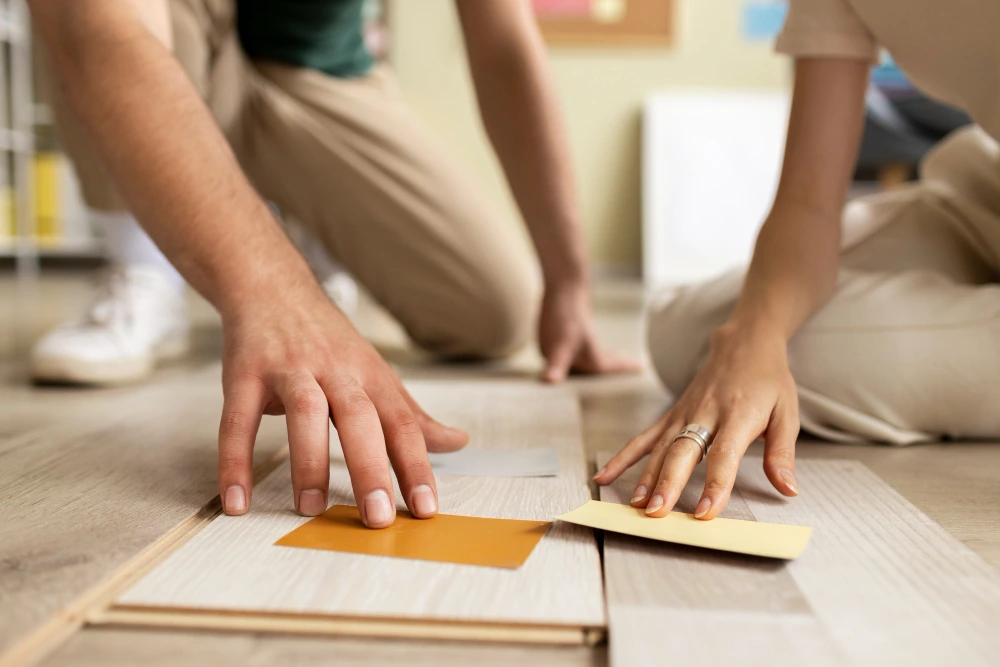No wonder you are on two minds between engineered hardwood flooring and hardwood flooring when updating your home’s flooring. Both of them have their own perks, such as offering timeless aesthetics, durability, and more. But, engineered hardwood flooring has gained popularity over time.
Its stability makes it a preferred choice for several areas prone to environmental conditions, such as basements and kitchens. The engineered hardwood flooring also allows the installation of concrete subfloors. Moreover, their eco-friendly nature is also one of the reasons people choose them over solid hardwood flooring.
Next Door Flooringis here to guide you on the ins and outs of what is engineered hardwood flooring. We’ll discuss the characteristics that make engineered hardwood flooring a better choice than hardwood flooring. Lastly, we’ll also discuss what factors affect the cost of engineered hardwood floorings. So, without any further ado, let’s get into it.
Why Engineered Hardwood Flooring Is Better Than Hardwood Flooring
Deciding between engineered hardwood flooring or traditional engineered flooring is all that makes a difference. Choosing the former can transform your home’s aesthetics, longevity, and sustainability of your living room. Besides outshining standard flooring, they offer unique construction features, DIY-friendliness, long-term durability, and cost efficiency.
Let’s break down the features that make engineered hardwood flooring a better option than your traditional one.
Different Construction
To start with, the difference between engineered hardwood flooring and typical hardwood flooring lies in their construction. Engineered hardwood flooringsconsist of a layered design containing a plywood core with real wood veneer on top. This combination increases the flooring’s stability and also allows wider plank sizes. On the other hand, traditional hardwood flooring is solid wood milled from a single piece of lumber.
Engineered hardwood floorings have broader planks due to their construction. They give your place a more luxurious and modern feel, creating an inviting visual impact. The traditional hardwood flooring hardly creates this environment. They are limited in width to the natural dimensions of the tree from which it’s milled.
Environmental Sustainability
Engineered hardwood floorings are often considered more eco-friendly. This is due to their efficient use of hardwood resources. You’ll no longer need a plywood subfloor due to its environmental sustainability features.
On the flip side, hardwood flooring often contributes to deforestation concerns. However, it depends on the sourcing practices.
DIY-Friendliness
Engineered hardwood floorings are popular due to their ease of installation. It means they are DIY-friendly, and you can easily access and install them by yourself. This is due to its click-lock system, which allows a simple installation. This way, you can also save installation costs and add a personal touch to your home improvement project.
However, when it comes to simple hardwood flooring, they require professional expertise. You’ll need proper methods and specialized tools for their installation. So, they are potentially limited to DIY options.
Long-Term Durability
The layered construction of engineered hardwood floorings makes it a more durable option for a longer time. They are less prone to expansion or contraction issues. This ensures your floors will maintain their original appearance and structure over time. And they’ll hardly get a chance to fluctuate in variable environments.
On the other hand, hardwood floorings may be affected by changing temperature and humidity. They are usually susceptible to moisture and humidity and may expand or contract according to environmental conditions. Hardwood flooring is susceptible to warping, cupping, and other issues.
Cost Efficiency & Sustainability
Engineered hardwood flooring is more affordable than hardwood flooring. The former are efficient in the use of hardwood resources and are widely available. That’s why they can easily meet your budget needs. On the other hand, hardwood flooring may use more resources, costing more money.
Engineered hardwood floorings require less maintenance due to their stable and resistive nature. They show resistance to common issues like warping and cupping. On the flip side, hardwood flooring needs more maintenance, including regular refinishing to address scratches, dents, wear and tear.
BONUS
Basement-Approved
Basements are mostly prone to moisture, humidity, and water damage. That’s why engineered hardwood floorings are approved for them due to their stable and moisture-resistive construction. The layered design structure of engineered hardwood floorings prevents issues like warping and buckling. This makes them a suitable choice for below-grade installations.
However, traditional hardwood flooring is not recommended for basement areas. As these floorings are themselves prone to moisture and other relevant problems. Their solid construction makes them vulnerable to damp conditions found in basements.
Factors Affecting the Cost Of Engineered Hardwood Flooring
Now that you understand why engineered hardwood flooring is preferred over typical hardwood flooring, let’s understand what factors affect the cost of engineered hardwood flooring. Different areas have different prices, and so do different companies’ offers. But, there are some other factors that significantly affect the engineered hardwood flooring costs.
Quality Of Engineered Hardwood
Engineered hardwood floorings made with high-quality materials and smooth finishes come at a higher price. They demand precise workmanship. The quality of their hardwood veneer and overall construction also impact their costs.
Finishes And Styles
Unique finishes, exotic wood species, and intricate designs significantly raise the cost of engineered hardwood. If you are ordering a specialized treatment in their finishing or styling, it may come at a premium price. For instance, hand-scraped or distressed finishes that contribute to overall aesthetics come at higher prices.
Thickness Of The Top Veneer
The thickness of the top veneer also affects the cost of engineered floorings. This is because the real wood veneer affects the ability of engineered floors to be sanded and refinished. Their thicker veneer allows more refinishing cycles, increasing the lifespan and, eventually, the cost of engineered floors.
Core Material
The core material used in engineered hardwood flooringsimpacts the durability and stability. And thus influence the prices also. Whether it’s plywood or HDF, they contribute to a more stable flooring structure but also come with higher price tags.
Moisture Resistance
Engineered hardwood floorings that come with advanced moisture-resistant features cost more. They are specialized in sealant or water-resistant cores. That’s why they are more expensive. These added features make them valuable in moisture-susceptible areas such as kitchens and bathrooms.
Installation Method
The installation method can affect the overall cost of engineered flooring. The click-lock or floating installation methods are usually easier and more suitable for DIY projects. This means they reduce the labor costs. On the other hand, the glue-down or nail-down installation methods have intricate patterns and need professional installation. This method will cost more.
Why Engineered Hardwood Flooring Is Ideal for BasementsFinal Thoughts
Putting our discussion in a nutshell, we suggest you choose what is best for your place. We compared the features and perks of both engineered hardwood flooring and standard hardwood flooring. We discussed how the former one is a better choice than the latter one. Besides that, we talked about the factors that impact the cost of engineered floorings.
Now the ball is in your court!
Decide on the one that meets your place’s needs and budget limitations. Scroll through our other blogs to read more informative content regarding floorings.

